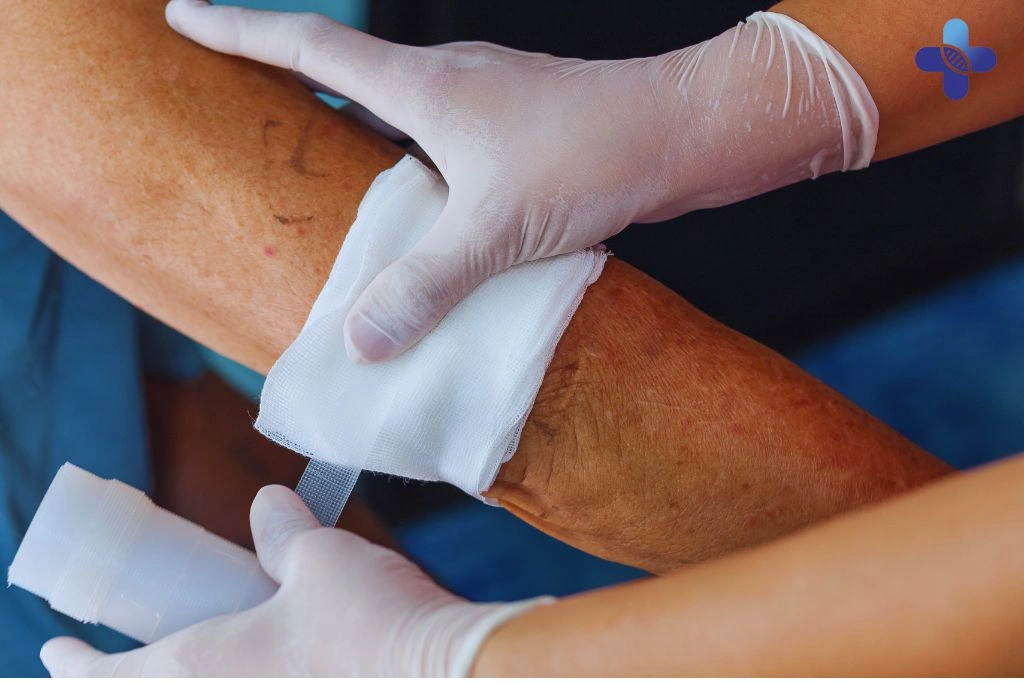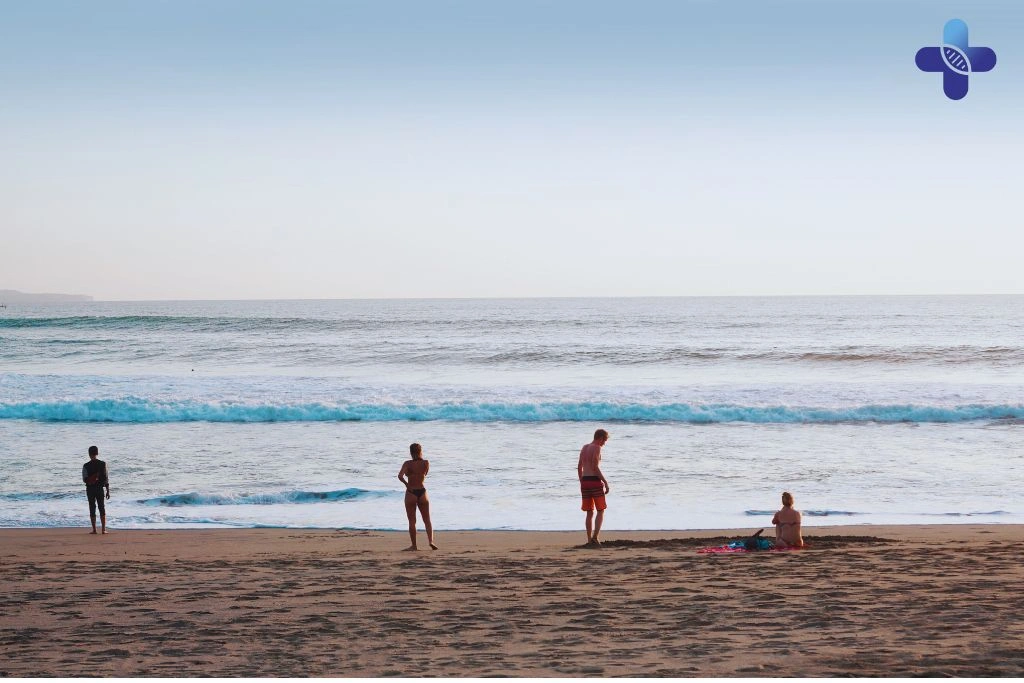Beach-related cuts in Bali are more common than most travelers expect—caused by coral, sharp rocks, or hidden glass on the sand. As part of the common wounds in Bali, these injuries can quickly become serious if not treated properly. In Bali’s tropical climate, even small wounds can lead to infections if not treated promptly. At Life Everyouth Bali, we regularly help tourists manage these injuries before complications arise. Knowing when to visit a reliable Medical Clinic in Bali can make all the difference in keeping your holiday safe and stress-free.

Beach-Related Cuts in Bali: What Tourists Must Know Before It’s Too Late
When spending time on Bali’s beautiful beaches, minor injuries like cuts, scrapes, or punctures are more common than you might expect. Coral reefs, sharp rocks, broken glass, or seashells can all pose hidden dangers—especially when barefoot. At Life Everyouth Bali, we often treat visitors who didn’t realize the risk of infection until it was too late.
While most beach-related cuts appear superficial, tropical climates like Bali’s make wound care more urgent. High humidity, sand exposure, and ocean bacteria increase the risk of infection. At Life Everyouth, we emphasize the importance of early cleaning, disinfection, and even tetanus or rabies consideration—especially for deeper wounds.
Why Beach Cuts Need Special Attention in Bali
Unlike minor scrapes in your home country, cuts in tropical zones like Bali can escalate faster. Coral cuts, in particular, tend to embed bacteria and foreign material into the skin. At Life Everyouth Clinic Bali, we often see these wounds turn into cellulitis or abscesses without proper care. The best practice? Seek a Bali Medical Clinic immediately.
Coral and Shell Cuts
Coral reefs and broken shells may look beautiful under the sea, but they can cause deep and painful cuts—especially for surfers and snorkelers. These wounds are often embedded with tiny coral particles and bacteria, which can delay healing or trigger infections. At Life Everyouth, we treat coral injuries with expert wound cleaning, infection prevention, and follow-up care tailored for Bali’s tropical setting. Learn more about coral wound care here.
Infections from Seawater
Open wounds exposed to seawater are at risk of serious infections. Warm tropical waters, especially in popular Bali beaches, may harbor bacteria like Vibrio vulnificus, which can enter through cuts and cause rapid inflammation or tissue damage. At Life Everyouth Bali, a trusted Bali Medical Clinic, we recommend prompt medical attention for any wound that has been in contact with ocean water, no matter how small it appears.
Beach Glass and Rock Lacerations
Sharp rocks, driftwood, and hidden glass fragments can cause unexpected injuries during a beach walk or game of volleyball. These lacerations can be deep and contaminated with debris. The team at Life Everyouth Clinic Bali is experienced in managing these types of wounds with professional debridement and sterile dressing. Our Medical Clinic in Bali ensures your cut heals properly and doesn’t interfere with the rest of your trip.
When to Seek a Medical Clinic in Bali
Not all cuts require emergency care, but you should seek help if your wound is deep, won’t stop bleeding, or starts to show signs of infection such as redness, swelling, or pus. Time is critical in the tropics—minor wounds can escalate quickly. Life Everyouth Bali offers accessible, professional care from licensed doctors at multiple locations. Trust us as your go-to Medical Clinic Bali for beach-related injuries.

Tips for Prevention and Recovery
Rinse Cuts with Clean Water, Not Seawater
The first step in wound care is rinsing the area with bottled or sterile water—never seawater. Ocean water in Bali may contain bacteria or microorganisms that can worsen the injury. At Life Everyouth Bali, we always emphasize clean irrigation as the foundation of proper tropical wound care.
Protect Your Feet from Hidden Dangers
Avoid walking barefoot on reefs, sharp rocks, or beach trails where debris may be present. Many of the beach-related cuts in Bali happen when tourists least expect them. Wearing reef shoes or sandals can significantly reduce your risk of injury. Stay safe and protect your steps—especially in unfamiliar areas.
Don’t Wait for Symptoms to Get Worse
If you notice swelling, increased pain, or redness around the wound, don’t delay seeking help. In Bali’s tropical climate, infections can escalate within hours. Life Everyouth, a reliable Medical Clinic in Bali, offers same-day wound care for fast recovery and peace of mind.
Keep Your Tetanus Shots Updated
Tetanus bacteria are commonly found in sand, soil, and seawater. If your last tetanus booster was over five years ago, it may be time for a renewal—especially after a deep or dirty wound. Life Everyouth Clinic Bali provides quick assessment and vaccination to help you stay protected during your stay.
Choose a Trusted Medical Clinic in Bali
Not all wounds can be treated with a simple rinse and a bandage. Visit a professional facility like Life Everyouth, a leading Bali Medical Clinic, for wound cleaning, dressing, and infection control. We’re here to ensure your recovery is smooth, safe, and doesn’t interrupt your island experience.

Conclusion of Beach Cuts in Bali: Medical Care Guide
Beach injuries might look harmless, but in Bali’s tropical climate, even a small cut can lead to serious complications if left untreated. At Life Everyouth, we provide comprehensive wound care in Bali to help you heal quickly and safely, so your holiday isn’t interrupted. Our Medical Clinic in Bali is ready to assist you every day.
FAQ Of Beach Cuts in Bali: Medical Care Guide
Are beach cuts in Bali dangerous?
Yes, beach cuts in Bali can become dangerous if ignored. Due to the tropical heat and high humidity, even a small wound can develop an infection quickly—especially after exposure to sand or seawater. Bacteria like Staphylococcus or Vibrio thrive in these conditions. At Life Everyouth Bali, we strongly recommend professional wound care for all beach-related injuries.
What should I do if I get a coral cut in Bali?
Rinse the cut with clean, bottled or sterile water to remove debris and bacteria. Do not use seawater or alcohol, as these may worsen tissue damage. Coral cuts often embed small particles that can cause prolonged infection. Visit Life Everyouth, a trusted Medical Clinic in Bali, for proper wound assessment and care.
Can saltwater help clean wounds?
Although salt has mild antiseptic properties, seawater in Bali is not sterile and can introduce harmful microbes. Relying on ocean water to clean wounds can increase the risk of infection. Always use clean water or a saline solution. At Life Everyouth Clinic Bali, we recommend immediate disinfection and dressing at a medical facility.
Should I worry about tetanus or rabies after a beach cut?
Yes, especially if the wound is deep, dirty, or caused by an unknown object. Tetanus bacteria thrive in soil and sand, and animal scratches or bites on the beach may require rabies evaluation. At Life Everyouth Bali, we offer tetanus boosters and rabies vaccine as part of our emergency response. Don’t take chances—visit a Bali Medical Clinic for expert advice.
How soon should I see a doctor for a beach-related wound?
Seek medical attention within 24 hours if your wound is deep, bleeding, or starts showing redness, pain, or swelling. Quick intervention can prevent serious infections or complications. Life Everyouth, a leading Medical Clinic in Bali, provides same-day care for all types of minor to moderate wounds. Early treatment ensures faster and safer healing.
Can I swim with an open cut in Bali?
Swimming with an open cut is not recommended, especially in the ocean. Bali’s seawater can contain bacteria that may enter your wound and lead to infection. Wait until the wound has fully closed and healed. Visit Life Everyouth Bali to monitor your recovery and determine when it’s safe to return to the water.
Are medical clinics in Bali equipped to treat cuts?
Yes, reputable clinics like Life Everyouth Bali are fully equipped to handle cuts, scrapes, and minor trauma. We offer wound cleaning, antibiotics, tetanus boosters, and follow-up care when necessary. Our medical team is experienced in treating both locals and international visitors. Trust our Bali Medical Clinic to restore your comfort and safety.
How can I prevent getting cuts at the beach?
Wear reef shoes or protective sandals, especially when walking on coral or rocky areas. Stay alert for hidden debris like broken glass or sea urchins. Avoid barefoot strolls on unfamiliar sands. At Life Everyouth, we encourage beachgoers to take simple precautions to avoid a visit to the Medical Clinic in Bali.
What are signs that my cut is infected?
Look out for redness, warmth, swelling, pus, or a foul smell from the wound. Pain that increases over time or fever may also signal infection. These signs mean you need urgent medical attention. Life Everyouth Clinic Bali provides prompt treatment to prevent the infection from spreading.
Is Life Everyouth open for walk-ins?
Yes, Life Everyouth Bali welcomes walk-in patients and emergencies at all our clinic locations across Canggu, Seminyak, Ubud, and Nusa Dua. No appointment is necessary—we understand how quickly wounds can worsen. Our English-speaking team ensures your care is fast, clear, and effective. Trust us as your reliable Medical Clinic in Bali while traveling.

